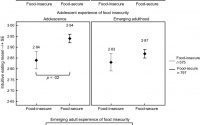Celiac Patients Who Accidentally Ingest Gluten May Get Relief from New Medication
Researchers say an antibody known as AMG 714 targets a component that’s overexpressed in people with celiac disease.

For approximately 1 percent of the population — roughly 3 million Americans — exposure to even trace amounts of gluten can trigger digestive damage and a host of side effects, from diarrhea to vomiting.
Celiac disease is an autoimmune disorder that causes gastrointestinal issues when the body is exposed to gluten. Gluten is a family of proteins found in wheat, barley, and rye.
A wide range of common food products contain gluten, from soy sauce to beer. Add the ever-present risk of cross-contamination, and it can be difficult for people with celiac disease to avoid gluten entirely.
While a full “cure” for celiac disease doesn’t appear to be in the cards yet, researchers have found that an antibody can protect people with celiac when they inadvertently ingest small amounts of gluten.
The head of a celiac advocacy organization interviewed by Healthline says it’s a promising step on a road that will hopefully lead to a cure someday.
Antibody targets celiac mediator
The research, conducted by pharmaceutical company Amgen, revolves around the AMG 714 antibody.
AMG 714 targets interleukin-15, a mediator of celiac disease that’s overexpressed in people who have the condition.
When people with celiac disease are exposed to gluten, interleukin-15 causes an adverse effect.
“An average of half of all celiac disease patients on a gluten-free diet continue to have mucosal inflammation or damage, and a third have recurrent symptoms,” Francisco Leon, PhD, BS, the study director and consultant for Amgen, told Healthline in an email. “That is why we have been investigating medications to help prevent the consequences of hidden gluten.”
Leon and his team presented the findings at Digestive Disease Week 2018 in Washington, D.C.
While the antibody showed success in lessening adverse side effects from exposure to trace amounts of gluten, it’s not a “cure” that would allow celiac patients to move away from a gluten-free diet.
“AMG 714 is being studied as an adjunct to a gluten-free diet to prevent the consequences of contaminating gluten,” wrote Leon. “It’s important to note that this drug is being investigated for its potential to protect against modest contamination, not deliberately eating large amounts of gluten, like bread or pasta.”
Alice Bast, CEO of Beyond Celiac, an advocacy organization, says the development and testing of AMG 714 is an encouraging step for people with celiac disease.
“AMG 714, like most other treatments being studied, would not mean celiac disease patients can go off the gluten-free diet, but they would be able to go out to a restaurant and eat from the gluten-free menu without having to worry, for example, about whether the grill was scrubbed absolutely clean before their dinner was made,” Bast wrote in an email to Healthline.
“Beyond Celiac has been following the progress of AMG 714 for a long time, and I am encouraged to see that results show some improvement in intestinal reactions and fewer symptoms reported by study participants,” she added. “We don’t know, in the end, which potential treatment will be the first to get FDA [U.S. Food and Drug Administration] approval and be available to patients. We do know one is desperately needed.”
Signs of hope for people with celiac disease
Bast notes that among gastrointestinal ailments, celiac disease receives the lowest funding and least amount of research from the National Institutes of Health, even though it’s the most prevalent in this category.
It’s also worth noting that for people with celiac disease who are vigilant in following a gluten-free diet, there’s an adverse effect on quality of life, with study participants reporting heightened anxiety and stress.
Besides Amgen’s work with AMG 714, there are several other drugs moving through the pipeline that could someday offer relief for people with celiac disease.
A therapeutic vaccine, Nexvax2, is aimed at treating celiac disease.
Another drug, Latiglutenase, is designed to use enzymes to degrade glutens, though it’s hit some setbacks in recent trials.
A third drug, Larazotide Acetate, will move into phase III clinical trials this year.
“It wasn’t too long ago that few researchers and even fewer drug companies were interested in working on celiac disease treatments,” said Bast. “Fortunately, that is beginning to change. It can be frustrating for patients who have to keep waiting for new treatments, but we are optimistic that one of the drugs being studied will make its way from the lab into patients’ lives.”
“Gluten is a sneaky thing. If it were very easy to keep it out of the gluten-free diet, we would not be talking about drugs that would protect people even when they are doing everything they can to avoid gluten from all sources,” Bast added.
“But this is a first step needed before we can start talking about treatments that would eliminate the need for the gluten-free diet for people with celiac disease. That’s the real goal, a cure,” she said.
Source: Read Full Article


